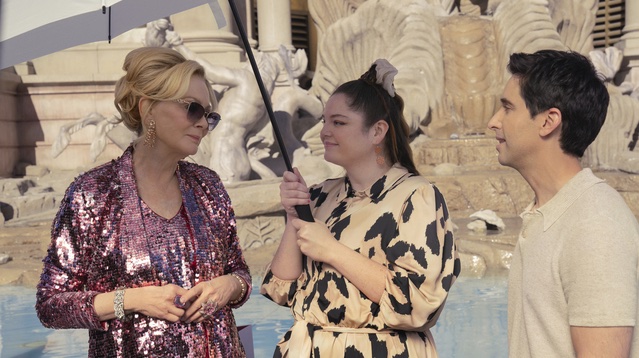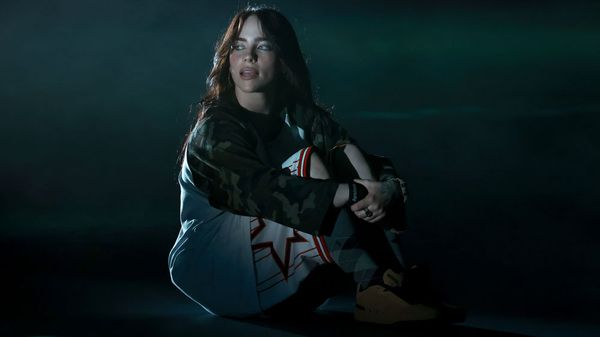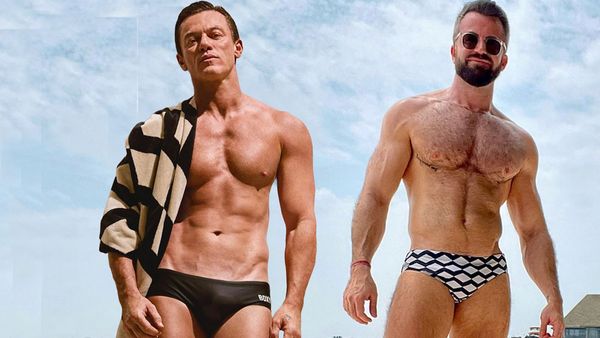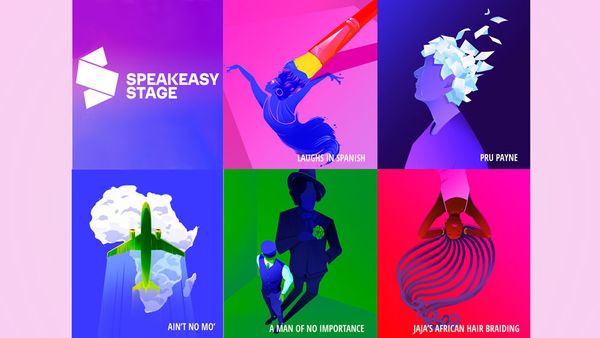May 10, 2015
Out Actress Maria Bello on Being A "Whatever"
Kilian Melloy READ TIME: 4 MIN.
Maria Bello has played a tough bar owner in "Coyote Ugly," a death-dealing alcohol lobbyist in "Thank You for Smoking," and a doctor on "ER." But in a story she tells in her new memoir, she was visiting the doctor herself. She told him that she'd been sick. He told her that it all stemmed from dating a woman.
"You've walked around your whole life with a big dildo pointed at everyone," the good doctor said. "You cannot receive; you need to receive a man."
This was the same (albeit said in one of the most insulting ways possible) message that Bello had grappled with all her life - find your Prince Charming, and everything will be better. Don't just find "the one" - become the one to somebody else. As she says in her new book, Whatever ... Love is Love, "I thought when I became the one all of my anxiety would disappear and then I would be someone. These bad princes were not going to do that for me. But I eventually learned that not even the good princes could."
It's a book about loving yourself and honoring the real relationships in your life, whether or not they fit the model of what family, friends or lovers are "supposed" to look like. Rejecting that nasty compulsory white-cis-heterosexism that tries to trap women - just find a man, and you'll be OK.
But in an interview with the Bay Area Reporter , Bello, 48, said the lesson isn't just for the heteros.
"We are all raised on this Prince and Princess Charming fantasy," she said. "I think it's about this whole idea of a soul mate, whether they're male, female, transgender, whatever. In the end the only soul mate we have is ourselves, and god really."
The "whatever" in the list of identities is intentional. Bello wrote "Whatever ... Love is Love" after her 2012 New York Times essay "Coming Out as a Modern Family" became one of the most shared installations of the paper's Modern Love column. In it, she wrote about telling her 12-year-old son that she was in love with a woman. "Mom, love is love, whatever you are," was his response. Bello hung on to those wise words as the only label she wants for herself.
"I would like to consider myself a 'whatever,' " she declares in the column.
"Right after the article came out, I got 200,000 hits on the Facebook page," Bello said. "People were just interested in the larger conversation. I had no idea how many families and partners were out there and didn't have labels to describe them. That's how this book was born. Other people are interested in these questions as well."
Bello will discuss her partnership, career, love and more in an appearance in San Francisco Friday, May 8 at the Jewish Community Center of San Francisco.
The book is structured as a questioning of every label that has made parts of Bello's identity, some ideas she rejects, and some that she holds on to. The table of contents reads like a worksheet. "Am I a partner? Am I forgiving? Am I a Catholic?"
In "Am I a Bad Girl?" Bello details her past relationships, many of which were affairs with married men.
"Sexuality is so complicated. I've always found it curious how many people have had affairs. It's just more complicated than we're willing to talk about or admit. More than 50 percent of people have had affairs," Bello said. "Are we saying affairs are bad, or can we look deeper into that?"
After finishing her book, most readers are likely to be willing to go deeper. Reading "Am I a Bad Girl?" was reminiscent of Bello's 2000 hit Coyote Ugly. The protagonist's father, played by John Goodman, sees his daughter dancing on the bar at her job, co-workers pouring pitchers of beer on her head. He gets mad. She gets home that night and calls him, telling him she loves him and she wants him to understand her, but that she won't apologize, because "I'm not sure I've done anything wrong." He just sits in his easy chair, brow furrowed, listening to his voicemail play, trying hard not to be disappointed.
Bello is similarly unapologetic. And even readers who start out feeling like Goodman in that easy chair may be willing to go deeper after reading what she has to say.
Bello addresses her LGBT identity in the chapter "Am I LGBT or W?" (the W, of course, is for Whatever.) She says that after her Times piece, the headline-length takeaway was "Maria Bello Comes Out as Gay," which she said doesn't tell the whole story.
That chapter also talks about the tragic death of legendary transgender activist Marsha P. Johnson in 1992. Bello has a somewhat disturbing connection to her. They were neighbors, Bello says. And the actress happened to be sitting by the Hudson River one night. And it was she who found Johnson's body, floating there.
Since then, Bello writes, she is trying "to find ways to honor her." Bello is involved in a movie about Johnson's life, and is rumored to have a male actor lined up for the starring role. When asked whether there was a chance a trans actress might be cast in the role, Bello said only, "We'll tell her story the best that we can."
Bello may also lend support to Queen's Cottage Shelter, a Bay Area shelter for trans women in the tradition of Johnson's STAR House.
Bello's book includes some other insights into her connection with political struggles, such as the origin of the organization she co-founded, We Advance, which produces educational videos by and for Haitian women. In Bello's chapter on Haiti, "Am I a Humanitarian?" she makes some questionable rhetorical choices, such as calling Haiti her "mistress" who is "dark and angry at times." But her philosophy on activism - the label she eventually chooses as more fitting than "humanitarian" - seems rooted in self-determination: "It's not just 'poor Haiti.' Haiti is filled with creative, expansive minds," Bello told the B.A.R. "The people in their own country, they know what they're doing. We just need to come in and support them."
Kilian Melloy serves as EDGE Media Network's Associate Arts Editor and Staff Contributor. His professional memberships include the National Lesbian & Gay Journalists Association, the Boston Online Film Critics Association, The Gay and Lesbian Entertainment Critics Association, and the Boston Theater Critics Association's Elliot Norton Awards Committee.






